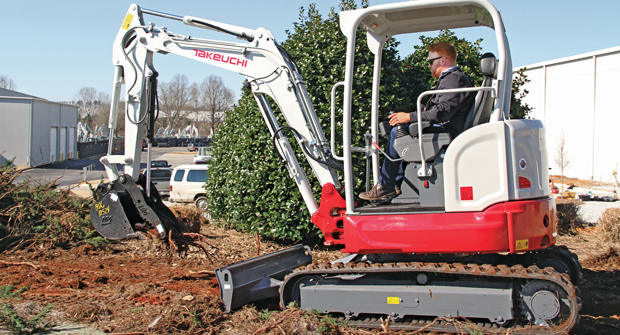
Compact excavators are strong and reliable tools that help landscape contractors work in small or tight access areas. Available on tracks or wheels, compact excavators come with a range of attachments.
To keep these machines running, experts say contractors must keep up with routine maintenance to make sure their excavators run smoothly and consistently.
Daily maintenance
When it comes to things contractors overlook when operating compact excavators, one of the most common issues is failing to perform daily maintenance.
“Contractors get busy and they have a lot on their minds and they’re eager to get out on the job site and get to work,” says David Caldwell, national product manager at Takeuchi. “That can make it tempting to skip daily walkarounds and maintenance checks. However, when you skip them, you’re not as clued into your machine’s health and you’re likely not finding those small problems that could quickly become big ones.”
Another issue is the failure to keep cooling systems on machines clean and free of debris and dust. The excavator’s radiator needs daily cleaning to maintain proper airflow, along with boosting engine and hydraulic component longevity, Caldwell says.
Caldwell adds that contractors should inspect the excavator’s undercarriage every day. Material can build up over time and wear out the components, leading to roller and idler problems. This is especially true when operating on muddy or hazardous job sites, he says.
Contractors will need to keep a close eye on engine fluid levels and filter status. This includes engine oil, hydraulic fluid, coolant, driver motor lubricants and grease. Using the wrong lubricants and not following the operator’s manual can lead to expensive repairs, Caldwell says.
Finally, Caldwell says it’s important to use compatible attachments and that are in good condition. The attachments must be suitable for the machine’s engines and hydraulics, while also not being excessively worn and free from dirt or debris. Using worn or improper attachments can damage the excavator itself, he says.
Keeping things in check
Downtime on job sites is costly, says Wesley Foy, product manager at Yanmar Compact Equipment North America. That’s why extending the life cycle of these tools is critical.
Foy says 99 percent of the procedures contractors should perform and how they should do them will be in the operator’s manual.
Despite a busy schedule, it is imperative to keep up with the service intervals of your compact equipment.
“If (contractors) miss a service interval, they should schedule or perform the missed service as soon as possible,” Caldwell says. “If contractors are concerned about potential damage that a missed service interval may have already caused, they should contact their dealers to explain what happened and set up any needed service or repairs.”
Foy says contractors should take the approach of “spend a little now, save a lot later.”
“It is better than spending none now and spending a lot later,” Foy says. “Maintenance is the most important thing to consider. Checking the breakers and fluid to keep the engine clean can be overlooked. And it can result in these machines breaking down, which causes unplanned downtime that contractors can’t afford.”
Caldwell says the best approach a contractor can take is to consider maintenance as a way to get the maximum out of the investment of that equipment.
“No excavator is maintenance-free, so if you’re not maintaining your machine, you’re asking for trouble,” he says. “Compact excavators must be correctly maintained to prolong their useful lives and enhance contractor productivity.”

